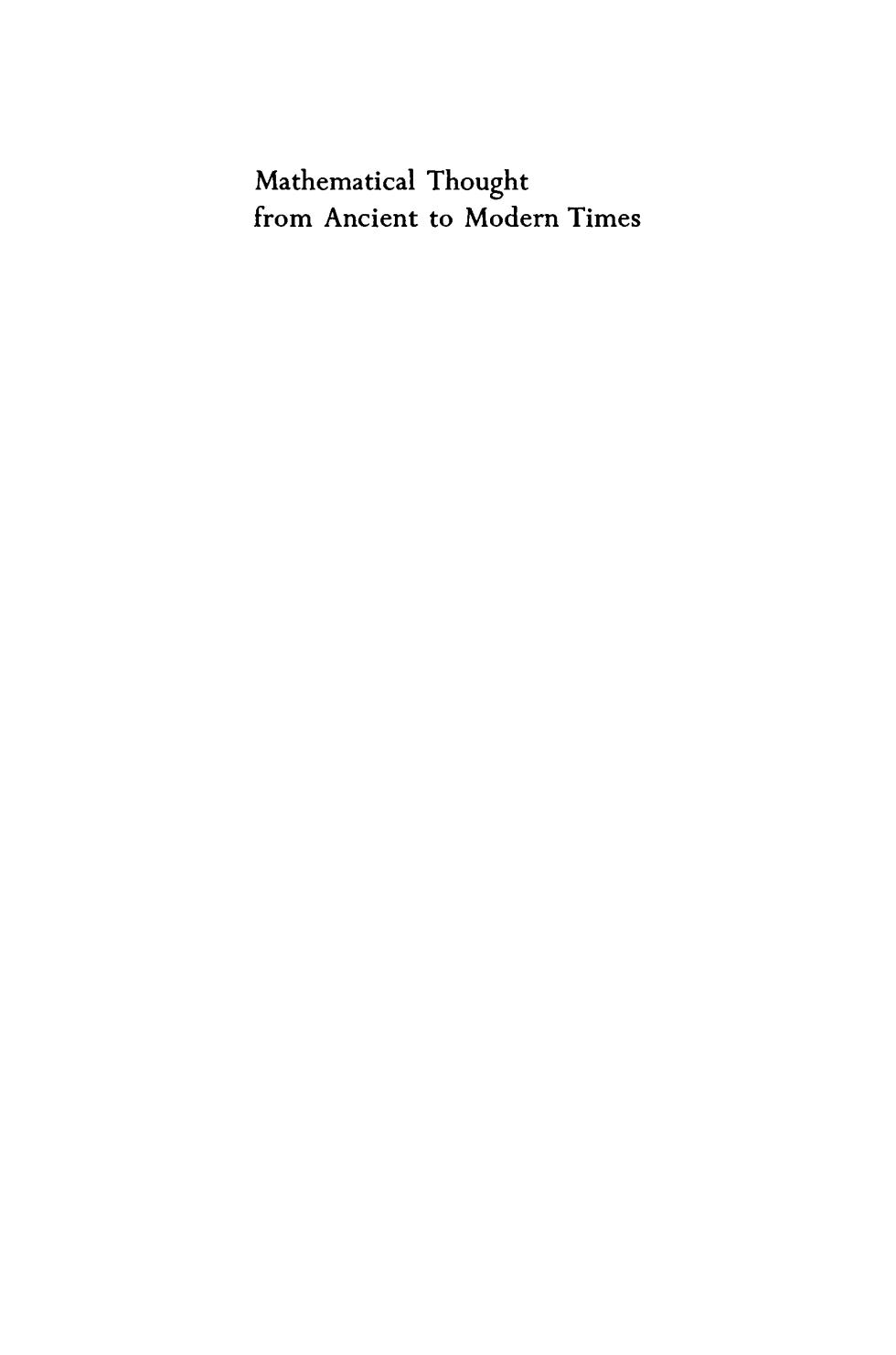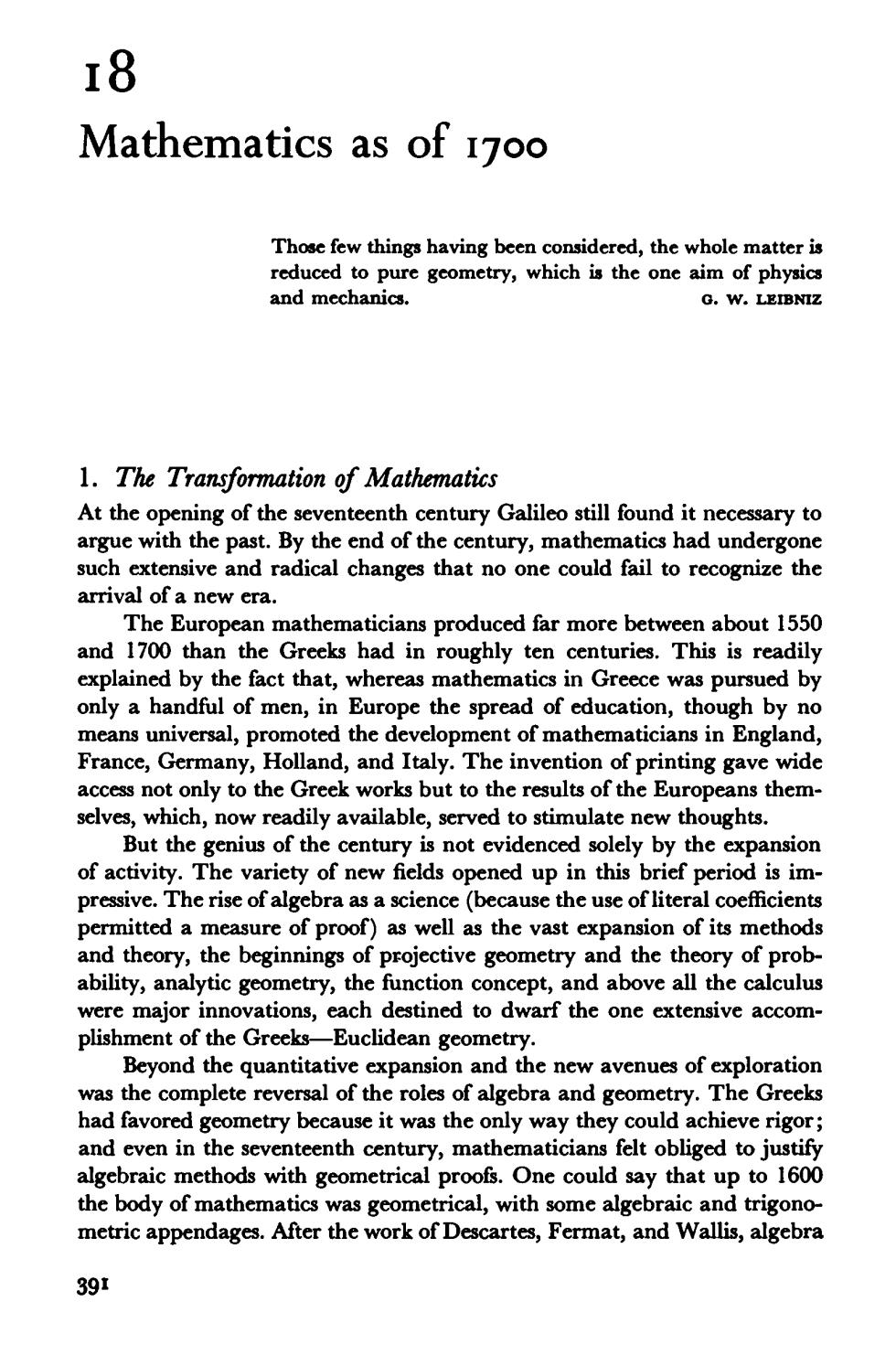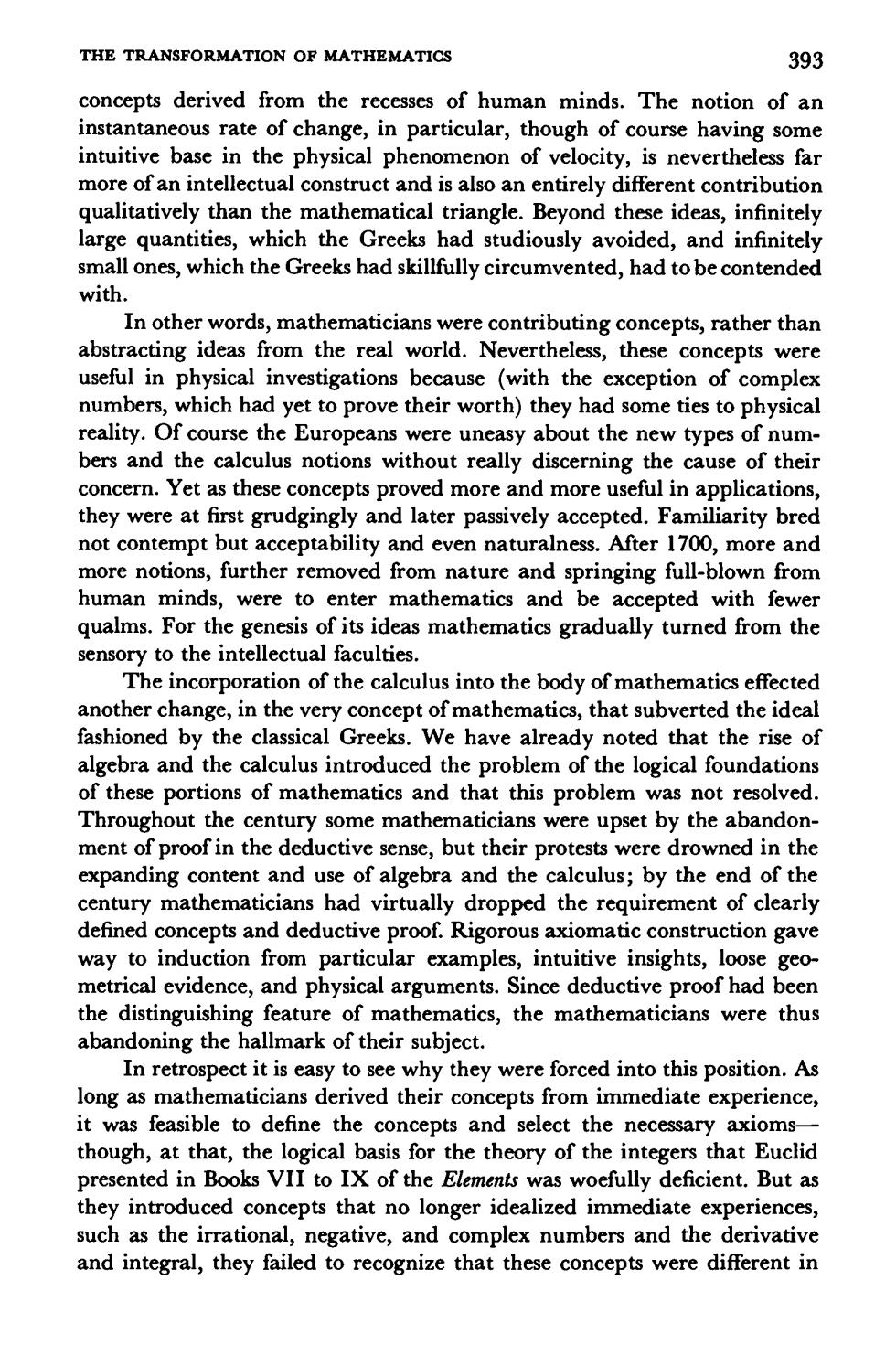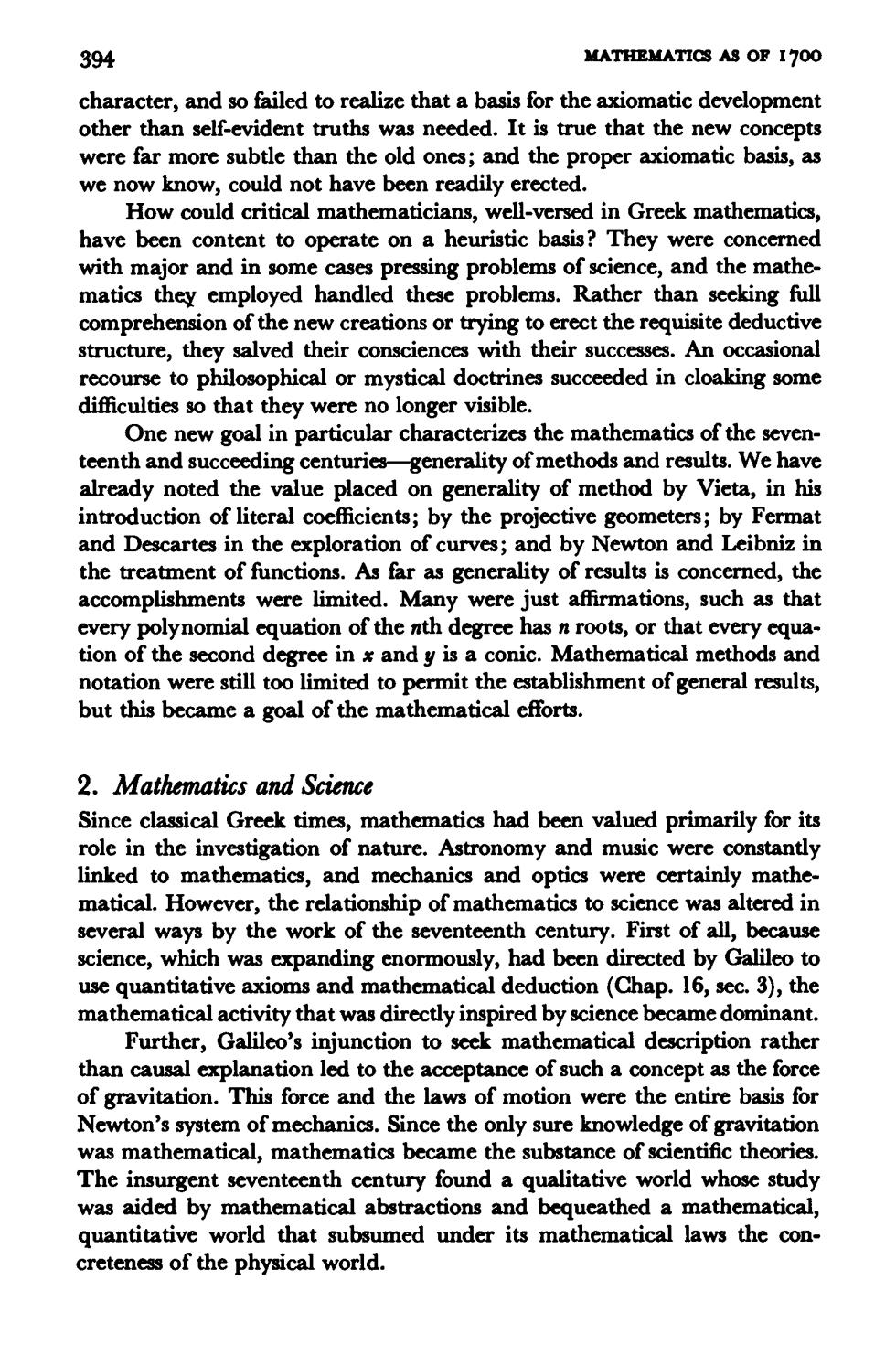
Mathematical Thought from Ancient to Modern Times

18 Mathematics as of I☑oo Those few things having been considered,the whole matter is reduced to pure gcometry,which is theona of physics and mechanics. G.W.LEIBNIZ 1.The Transformation of Mathematics At the opening of the seventeenth century Galileo still found it necessary to argue with the past.By the end of the century,mathematics had undergone such extensive and radical changes that no one could fail to recognize the arrival of a new era. The European mathematicians produced far more between about 1550 and 1700 than the Greeks had in roughly ten centuries.This is readily explained by the fact that,whereas mathematics in Greece was pursued by only a handful of men,in Europe the spread of education,though by no means universal,promoted the development of mathematicians in England, France,Germany,Holland,and Italy.The invention of printing gave wide access not only to the Greek works but to the results of the Europeans them- selves,which,now readily available,served to stimulate new thoughts. But the genius of the century is not evidenced solely by the expansior of activity.The variety of new fields opened up in this brief period is im- pressive.The rise of algebra as a science(because the use of literal coefficients permitted a measure of proof)as well as the vast expansion of its methods and theory,the beginnings of projective geometry and the theory of prob- ability,analytic geometry,the function concept,and above all the calculus were major innovations,each destined to dwarf the one extensive accom- plishment of the Greeks-Euclidean geometry Beyond the quantitative expansion and the new avenues of exploration was the complete reversal of the roles of algebra and geometry.The Greeks had favored geometry because it was the ony way they could achicve rigor; and even in the seventeenth century,mathematicians felt obliged to justify algebraic methods with geometrical proofs.One could say that up to 1600 the body of mathematics was geometrical,with some algebraic and trigono- metric appendages.After the work of Descartes,Fermat,and Wallis,algebra 391

392 MATHEMATICS AS OF 1700 became not only an effective methodology for its own ends but also the superior approach to the solution of geometric problems.The greater effec- tiveness of analytical methods in the calculus decided the competition,and algebra became the dominant substance of mathematics. It was Wallis and Newton who saw clearly that algebra provided the superior methodology.Unlike Descartes,who regarded algebra as just tech nique,Wallis and Newton realized that it was vital subject matter.The work of Desargues,Pascal,and La Hire was depreciated and forgotten,and the geometric methods of Cavalieri,Gregory of Saint Vincent,Huygens,and Barrow were superseded.Pure gcometry was eclipsed for about a hundred years,becoming at best an interpretation of algebra and a guide to algebraic thinking through coordinate geometry.It is true that excessive reverence for Newton's geometrical work in the Principia,reinforced by the enmity against the Continental mathematicians engendered by the dispute between Newton to what the Continentals were able to achieve using the analytical approach. What was evident by 1700 was explicitly stated by no less an autho prity than Euler,who,in his Introductio in Analysin Infinitorum (1748),praises algebra as far superior to the synthetic methods of the Greeks It was with great reluctance that mathematicians abandoned the geo- metric approach.According to Henry Pemberton (1694-1771),who edited the third edition of Newton's Principia,Newton not only constantly expressed great admiration for the geometers of Greece but censured himself for not ollowing them more closely than he did.In a letter to David Gregory (1661-1708),a nephew of James Gregory,Newton remarked that"algebra is the analysis of the bunglers in mathematics."But his own Arithmetica Universalis of 1707 did as much as any single work to establish the supremacy of algebra.Here he set up arithmetic and algebra as the basic science, allowing geometry only where it made demonstrations easier.Leibniz,too. noted the growing dominance of algebra and felt obliged to say,in an un- published essay,1 "Often the geometers could demonstrate in a few words what is very lengthy in the calculus.the view of algebra is assured,but it is not better.' Another,more subtle,change in the nature of mathematics had beer unconsciously accepted by the masters.Up to 1550 the concepts of mathe- matics were immediate idealizations of or abstractions from experience.By that time negative and irrational numbers had made their appearance and were gradually gaining acceptance.When,in addition,complex numbers, an extensive algebra employing literal coefficients,and the notions of deriva tive and integral entered mathematics,the subject became dominated by 1.Couturat,L.:Opuscules et fragments inddits de Leibniz,1903,reprinted by Georg Olms, 1961,P.181

THE TRANSFORMATION OF MATHEMATICS 393 concepts derived from the recesses of human minds.The notion of an instantaneous rate of change,in particular,though of course having some intuitive base in the physical phenomenon of velocity,is nevertheless far more of an intellectual construct and is also an entirely different contribution qualitatively than the mathematical triangle.Beyond these ideas,infinitely large quantities,which the Greeks had studiously avoided,and infinitely small ones,which the Greeks had skillfully circumvented,had to be contended with In other words,mathematicians were contributing concepts,rather than abstracting ideas from the real world.Nevertheless,these concepts were useful in physical investigations because (with the exception of complex numbers,which had yet to prove their worth)they had some ties to physical reality.Of course the Europeans were uneasy about the new types of num- bers and the calculus notions without really discerning the cause of their concern.Yet as these concepts proved more and more useful in applications. they were at first grudgingly and later passively accepted.Familiarity bred not contempt but acceptability and even naturalness.After 1700,more and more notions,further removed from nature and springing full-blown from human minds,were to enter mathematics and be accepted with fewer qualms.For the genesis of its ideas mathematics gradually turned from the sensory to the intellectual faculties. The incorporation of the calculus into the body of mathematics effected another change,in the very concept of mathematics,that subverted the ideal fashioned by the classical Greeks.We have already noted that the rise of algebra and the calculus introduced the problem of the logical foundations of these portions of mathematics and that this problem was not resolved. Throughout the century some mathematicians were upset by the abandon ment of proof in the deductive sense,but their protests were drowned in the expanding content and use of algebra and the calculus;by the end of the century mathematicians had virtually dropped the requirement of clearly defined concepts and deductive proof.Rigorous axiomatic construction gave way to induction from particular examples,intuitive insights,loose geo metrical evidence,and physical arguments.Since deductive proof had been the distinguishing feature of mathematics.the mathematicians were thus abandoning the hallmark of their subject. In retrospect it is easy to see why they were forced into this position.As long as mathematicians derived their conceptsfrom immediateexperienc it was feasible to define the concepts and select the necessary axioms- though,at that,the logical basis for the theory of the integers that Euclid presented in Books VII to IX of the Elements was woefully deficient.But as they introduced concepts that no longer idealized immediate experiences, such as the irrationa negative,and complex numbers and the derivative and integral,they failed to recognize that these concepts were different in

394 MATHEMATICS AS OF 1700 character,and so failed to realize that a basis for the axiomatic development other than self-evident truths was needed.It is true that the new concepts were far more subtle than the old ones;and the proper axiomatic basis,as we now know,could not have been readily erected. How could critical mathematicians,well-versed in Greek mathematics, have been content to operate on a heuristic basis?They were concerned with major and in some cases pressing problems of science,and the mathe- matics they employed handled these problems.Rather than seeking full comprehension of the new creations or trying to erect the requisite deductive structure,they salved their consciences with their successes.An occasional recourse to philosophical or mystical doctrines succeeded in cloaking some difficulties so that they were no longer visible. One new goal in particular characterizcs the mathematics of the seven teenth and succeeding centuries-generality of methods and results.We have already noted the value placed on generality of method by Vieta,in his introduction of literal coefficients;by the projective geometers;by Fermat and descartes in the exploration of curves;and by Newton and Leibniz in the treatment of functions.As far as generality of results is concerned,the accomplishments were limited.Many were just affirmations,such as that every polynomial cquation of the nth degree has n roots,or that every equa tion of the second degree in and y is a conic.Mathematical methods and notation were still too limited to permit the establishment of general results, but this became a goal of the mathematical efforts. 2.Mathematics and Science Since classical Greck times,mathematics had been valued primarily for its role in the investigation of nature.Astronomy and music were constantly linked to mathematics,and mechanics and optics were certainly mathe- matical.However,the relationship of mathematics to science was altered in several ways by the work of the seventcenth century.First of all,because science,which was expanding enormously,had been directed by Galileo to use quantitative axioms and mathematical deduction (Chap.16,sec.3),the mathematical activity that was directly inspired by science became dominant. Further,Galileo's injunction to seck mathematical description rather than causal explanation led to the acceptance of such a concept as the force of gravitation.This force and the laws of motion were the entire basis for Newton's system of mechanics.Since the only sure knowledge of gravitation was mathematical.mathematics became the substance of scientific theories The insurgent seventeenth century found a qualitative world whose study was aided by mathematical abstractions and bequcathed a mathematical, quantitative world that subsumed under its mathematical laws the con creteness of the physical world